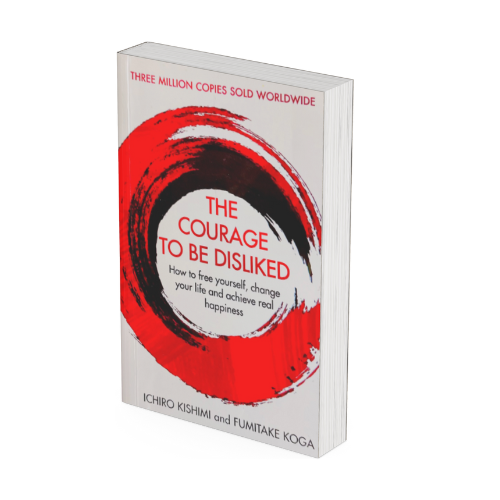The Courage to be Disliked
by Fumitake Koga and Ichiro Kishimi
The Author
Japanese writer Fumitake Koga is well-known for his work as a ghostwriter and his partnerships with specialists in many industries. With The Courage to Be Disliked, Koga makes complex psychological ideas comprehensible to the layperson. Japanese philosopher and educator Ichiro Kishimi owes a great debt to the work of the late seminal psychologist Alfred Adler. The dialogue-driven book by Koga and Kishimi dissects Adlerian concepts, prompting readers to reconsider their sense of identity, relationships, and the pursuit of pleasure.
Summary of The Courage to Be Disliked
The psychological theories put forward by Alfred Adler in this book highlight the significance of individual agency and autonomy. A philosopher presents Adler’s beliefs on happiness, interpersonal relationships, and life in a conversational style with a young man in the book.
In contrast to Freud’s and Jung’s philosophies, Adler’s centres on the premise that the significance one ascribes to traumatic experiences determines how they manifest in the present. He thinks everyone is capable of making their own decisions and that achieving happiness requires letting go of the need to be liked by others. The author of this book wants its readers to know that trying to win everyone’s approval is a surefire method to bring nothing but pain into their own lives.
The book focuses on the idea of “separation of tasks”—that is, everyone has to take care of their own business and not stress over how other people perceive or react to them. You can muster the strength to concentrate on your controllables after you figure out which responsibilities are yours and which are someone else’s.
Rather than getting mired in the past or worried about the future, the conversation explores the value of embracing the here and now. It stresses not viewing life as a competition, accepting oneself as one does, and having a strong sense of community.
My Thoughts on The Courage to Be Disliked
I learnt a lot about myself as a people-pleaser from The Courage to Be Disliked. In every aspect of my life, from professional relationships to relationships with loved ones, I have strived to win the approval of those around me. Reading the book truly made me think twice about that attitude and made me realise how harmful it is to feel the need for validation all the time. This experience taught me that putting other people’s pleasure ahead of my own isn’t sustainable. I had to stop sacrificing my own happiness and peace for the sake of different people.
I can relate to the concept of job separation. Though liberating, the idea that I am not responsible for other people’s emotions and reactions was challenging to absorb. For some reason, I’ve always felt responsible for making other people happy and mending their fences when they were unhappy or disliked me. Reading this book made me realise that I need to stop wasting time on other people’s problems and start solving my own—a simple concept with great force.
The book’s dialogue style also helped make the lessons more straightforward. Identifying the problems discussed in the philosophical dialogue between the young man and the philosopher was simple. It was as if I were a participant in the discussion, struggling with the same uncertainties and concerns.
Another noteworthy aspect of the novel was the concept of moving on from the past. It became apparent to me how deeply my actions and sense of self are rooted in my prior experiences and traumas, but according to Adler’s concept outlined in the book, one’s past need not dictate one’s future. I found this to be an interesting new angle.
Ultimately, the lesson I took away from The Courage to Be Disliked was that if I want to be happy, I need to stop trying to be someone other people want me to be and start being myself. True authenticity requires guts since you have to know that some people won’t like you no matter what you do, but that’s alright.
Clients and Colleagues Should Embrace the Lessons of The Courage to Be Disliked
The most important things I hope my clients and other professionals in the helping professions learn from this book are:
- You are valuable regardless of what other people think. Stop trying to prove your worth to yourself or others. It is essential for one’s mental and emotional health to live authentically without constantly seeking approval.
- Separate your tasks from others. Realise that everyone has their own duties and obligations. Nobody can hold you accountable for how others feel or what they do. This understanding can effectively reduce anxiety and unwarranted guilt.
- Focus on the present moment. Stop fixating on the past or worrying about the future. The here and now is where you have the power to make a difference.
- Recognise that some people will dislike you. Trying to win over everyone’s favour is unhealthy and leads nowhere. This book can help you overcome your fear of rejection and embrace your true self.
- Emphasise community feeling. Adler’s philosophy values making meaningful contributions to society and relationships without competing with others. This approach allows one to focus on the joy of connection and contribution.
- Own your life. Your reactions and interpretations of events are up to you. It’s not your past but your perception of it that holds you back. Encourage clients to take charge of their own narrative.
- Stop competing. Worrying about not being good enough compared to others is unhealthy. Direct your energy toward developing yourself and making a positive impact on those around you.
In Summary
To sum up, The Courage to Be Disliked is an impactful read that makes its readers question their reliance on approval from others, embrace their true selves, and lead genuine lives. It teaches you the hard way that it’s alright to not be liked by everyone, to concentrate on what you can change, and to move on from the past. If you’re someone who is always trying to get other people’s approval, this book will give you the tools you need to stop and start living your life to the fullest.
The Courage to be Disliked
by Fumitake Koga and Ichiro Kishimi
The Author
Japanese writer Fumitake Koga is well-known for his work as a ghostwriter and his partnerships with specialists in many industries. With The Courage to Be Disliked, Koga makes complex psychological ideas comprehensible to the layperson. Japanese philosopher and educator Ichiro Kishimi owes a great debt to the work of the late seminal psychologist Alfred Adler. The dialogue-driven book by Koga and Kishimi dissects Adlerian concepts, prompting readers to reconsider their sense of identity, relationships, and the pursuit of pleasure.
Summary of The Courage to Be Disliked
The psychological theories put forward by Alfred Adler in this book highlight the significance of individual agency and autonomy. A philosopher presents Adler’s beliefs on happiness, interpersonal relationships, and life in a conversational style with a young man in the book.
In contrast to Freud’s and Jung’s philosophies, Adler’s centres on the premise that the significance one ascribes to traumatic experiences determines how they manifest in the present. He thinks everyone is capable of making their own decisions and that achieving happiness requires letting go of the need to be liked by others. The author of this book wants its readers to know that trying to win everyone’s approval is a surefire method to bring nothing but pain into their own lives.
The book focuses on the idea of “separation of tasks”—that is, everyone has to take care of their own business and not stress over how other people perceive or react to them. You can muster the strength to concentrate on your controllables after you figure out which responsibilities are yours and which are someone else’s.
Rather than getting mired in the past or worried about the future, the conversation explores the value of embracing the here and now. It stresses not viewing life as a competition, accepting oneself as one does, and having a strong sense of community.
My Thoughts on The Courage to Be Disliked
I learnt a lot about myself as a people-pleaser from The Courage to Be Disliked. In every aspect of my life, from professional relationships to relationships with loved ones, I have strived to win the approval of those around me. Reading the book truly made me think twice about that attitude and made me realise how harmful it is to feel the need for validation all the time. This experience taught me that putting other people’s pleasure ahead of my own isn’t sustainable. I had to stop sacrificing my own happiness and peace for the sake of different people.
I can relate to the concept of job separation. Though liberating, the idea that I am not responsible for other people’s emotions and reactions was challenging to absorb. For some reason, I’ve always felt responsible for making other people happy and mending their fences when they were unhappy or disliked me. Reading this book made me realise that I need to stop wasting time on other people’s problems and start solving my own—a simple concept with great force.
The book’s dialogue style also helped make the lessons more straightforward. Identifying the problems discussed in the philosophical dialogue between the young man and the philosopher was simple. It was as if I were a participant in the discussion, struggling with the same uncertainties and concerns.
Another noteworthy aspect of the novel was the concept of moving on from the past. It became apparent to me how deeply my actions and sense of self are rooted in my prior experiences and traumas, but according to Adler’s concept outlined in the book, one’s past need not dictate one’s future. I found this to be an interesting new angle.
Ultimately, the lesson I took away from The Courage to Be Disliked was that if I want to be happy, I need to stop trying to be someone other people want me to be and start being myself. True authenticity requires guts since you have to know that some people won’t like you no matter what you do, but that’s alright.
Clients and Colleagues Should Embrace the Lessons of The Courage to Be Disliked
The most important things I hope my clients and other professionals in the helping professions learn from this book are:
- You are valuable regardless of what other people think. Stop trying to prove your worth to yourself or others. It is essential for one’s mental and emotional health to live authentically without constantly seeking approval.
- Separate your tasks from others. Realise that everyone has their own duties and obligations. Nobody can hold you accountable for how others feel or what they do. This understanding can effectively reduce anxiety and unwarranted guilt.
- Focus on the present moment. Stop fixating on the past or worrying about the future. The here and now is where you have the power to make a difference.
- Recognise that some people will dislike you. Trying to win over everyone’s favour is unhealthy and leads nowhere. This book can help you overcome your fear of rejection and embrace your true self.
- Emphasise community feeling. Adler’s philosophy values making meaningful contributions to society and relationships without competing with others. This approach allows one to focus on the joy of connection and contribution.
- Own your life. Your reactions and interpretations of events are up to you. It’s not your past but your perception of it that holds you back. Encourage clients to take charge of their own narrative.
- Stop competing. Worrying about not being good enough compared to others is unhealthy. Direct your energy toward developing yourself and making a positive impact on those around you.
In Summary
To sum up, The Courage to Be Disliked is an impactful read that makes its readers question their reliance on approval from others, embrace their true selves, and lead genuine lives. It teaches you the hard way that it’s alright to not be liked by everyone, to concentrate on what you can change, and to move on from the past. If you’re someone who is always trying to get other people’s approval, this book will give you the tools you need to stop and start living your life to the fullest.
“True healing occurs when I accept the circumstances of my life and forgive myself.”
Recent Thoughts
Stay with the Feeling
I see it every week in the clinic, and I recognise it in myself. The moment a feeling squeezes, we reach for the
When Your Feelings Flash Like a Dashboard Light
I still remember the first time the oil light glared at me during a late-night drive back from a workshop. My pulse spiked.




